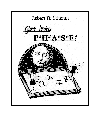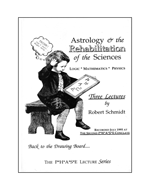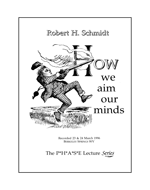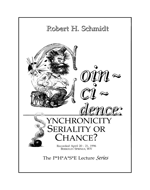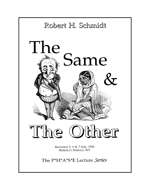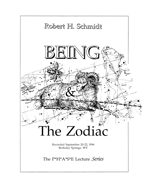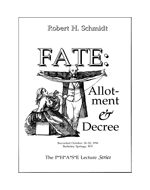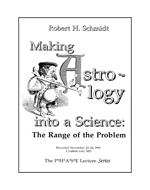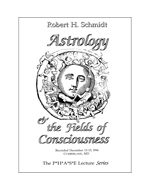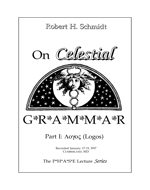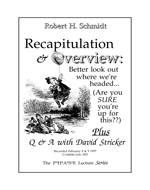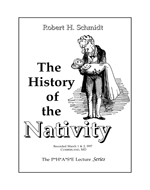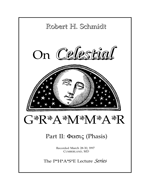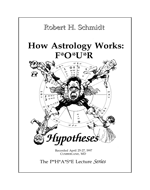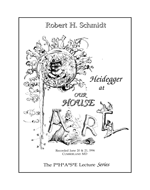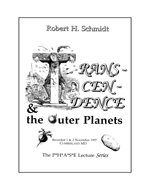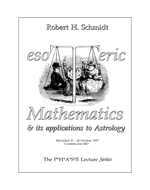Archives The PHASE Lectures
The complete PHASE Lectures are now available on Mp3-format CDs - click here for details
Get into PHASE
A six-hour introduction to the PHASE lectures, an on-going series of exercises in the applications of Philosophy, History, Science, Epistemology & Esoteric wisdom to Astrology and conversely, the implications of astrology for those disciplines.
Astrology and the Rehabilitation of the Sciences: Logic, Mathematics & Physics
Overture lectures given at the 2nd PHASE Conclave, arguing that Logic, Mathematics and Physics will have to be totally refurbished and rehabilitated before they can deal adequately with the question of Astrology. The response to these talks led to the introduction of the PHASE Lecture series.
How We Aim Our Minds
The ancients aimed their minds (Intentionality) in ways different than we do today. The different experience of sensation, emotions and cognition is reflected in the Greek language and may help form a theoretical framework for astrological influences. Schmidt argues that planets are consciousnesses and provides an example of a theoretical framework for astrology by relating them to the different metaphysical worlds proposed by Plato and others.
COINCIDENCE: Synchronicity, Seriality, & Chance
Robert Schmidt presents a fresh view on coincidence and astrology. Different views of chance such as Kammerer's seriality and Jung's synchronicity are presented and looked at in the context of the problem of astrology.
A Natural History of Time
In this workshop, Robert Schmidt seeks first to restore the original experience of Time in ancient astrology and philosophy; secondly, to distinguish it carefully from the modern scientific view; and, finally, to reach an accommodation of ancient temporality within modern thought. These are necessary preliminary steps for a 'rehabilitated' modern astrology.
The Same & The Other
This workshop begins with discussion of two primary philosophical concepts which are critical to an understanding of Hellenistic astrology - logos and phasis. Schmidt encourages investigation of first principles that underlie experience of the world including Plato's Same & Other, and Aristotle's Form & Matter.
Being and the Zodiac
Ancient astrologers had a view of the relationship between the planets and the signs (zoidion) which differs from those of modern astrologers. Investigation in the nature of the zoidion leads to perhaps the most profound problem in metaphysics, the question of Being. Schmidt returns to the concepts of Phasis (an appearance that speaks) and Logos, as well as the Stoic concept of oikeiosis (familiarization) to deal with the three strata of Hellenistic Astrology: Ptolemaic (scientific), Stoic (philosophic), and Egyptian (divinatory).
FATE: Allotment & Decree
This discussion centers on some of the ancient views on fate including, Heimarmene in Valens, 'Anangke', 'Pronoia', and 'Tuche' in the Corpus Hermeticum, 'Kleros', the Greek word for Lot, and 'Moira', the Greek word for an allotment. Fuller understanding of the ancient concepts of Fate reveal the special roles of the Lots (later in history called 'Arabic Parts') in ancient astrology. Connections are made between the oracular or omen part of astrology and the logical side to astrology.
Making Astrology into a Science: The Range of the Problem
This workshop introduces modern developments of science, including Quantum theory, the Heisenberg uncertainty principle and Chaos theory, that may be explored while articulating a theory for Astrology. Difficulties with modern scientific theories are discussed and compared with classical views on causation. A scientific theory for astrology can be proposed because astrology deals with spatiality and temporality, although it requires a different understanding of time and space than one influenced by modern science. Problems of why a nativity should be fixed at the birth moment and prediction in astrology are addressed in a new way.
Astrology and the Fields of Consciousness
Focusing further on the scientific and philosophical part of the PHASE investigation, Schmidt draws upon Kant's Critique of Pure Reason and Aristotle's Metaphysics for a possible scientific framework for astrological causation. Modern mathematics and fractal dimensions are used to deal with intensification of qualities and the type of space and time relevant to astrological theory. The Light Metaphysics of medieval thinker Robert Grossteste is also introduced in discussion of the spacial and temporal fields of astrology.
On Celestial Grammar: Part I Logos
Hellenistic astrology provides a great starting point for investigating how we come to know anything. Astrology is a language with a special type of celestial grammar which can provide the standard for natural languages. Schmidt returns to concepts such as oikeiosis (familiarization) and little but profound words such as "it" and "is" which are involved in the connection of the signs to the planets, the subject to the verb, Being to Man. He also draws upon sources such as Heidegger's appropriation and Aristotle's prime mover, and relates them to the Greek concept of oikeiosis and astrology.
Recapitulation and Overview
In spite of its title, Robert Schmidt presents new material not discussed in previous talks. He reveals his motives behind introducing the philosophical material into the discussion of astrology and explains why the theoretical frameworks are important for astrological work. This slightly less formal talk presents a collection of ideas, such as the Stoic theory of perception, Kant's Pure Concepts of the Understanding, and Schmidt's unique concept of phasis, as ways to stimulate thinking about the broader picture in which astrology plays a key role.
The History of the Nativity
Robert Schmidt takes a new look at what sort of spaciality and temporality belong to astrology. Rather than simply studying astrology historically, how can historical principles be applied to the nativity? This exploration involves the role of the natal chart as 'general' to additional charts as 'specific' such as returns, conceptions, and transits. This includes the Greek view of the natal chart as hypostasis and the relation of subsidiary charts as moments in an astrological history or destiny. Schmidt rounds out the discussion with a return to planets as consciousnesses which shape the temporal and spacial fields, a la Kant.
On Celestial Grammar: Part II Phasis
What does it mean for astrology to be a language? In this continued investigation into celestial grammar, Robert Schmidt looks at the very metaphysics of verbal structures as seemingly simple as "It Is" and relates them to the planets and the signs. He borrows clues from works such as Plato's Sophist and Timaeus, and Heidegger's Being and Time to understand the temporal and spacial nature to both grammar and astrology. As a counterpart to "Celestial Grammar: Part I Logos", Schmidt reintroduces the concept of 'phasis', an appearance that speaks, as the omen-like component to astrological language.
How Astrology Works: Four Hypotheses
In this Phasetalk weekend, Robert Schmidt approaches the problem of astrology from four different angles: from a (rehabilitated) scientific model, from a grammatical model, a philosophical model, and an historic framework. He then leads the listeners back to consider the initial and original experience of astrology.
Heidegger at our House Party
During the course of an exciting weekend, Robert Schmidt leads a Heideggerian phenomenological approach to the astrologer's experience. What is the nature of intuition and the moment of insight when reading a chart (or any moment of insight)? In our experience of this moment of insight reveals itself to consciousness, is it fleeing back into concealment or approaching? One meaning of Logos is unconcealment. Schmidt examines Heidegger's approach to this moment or unconcealment, the opening in the forest, the moment of appropriation.
Transcendence and the Outer Planets
How do we come to characterize the outer planets, Uranus, Neptune and Pluto? What does it mean when we call them 'transcendental' planets? Robert Schmidt offers a lucid philosophical approach to transcendence, framed in a discussion of Kant's Critique of Pure Reason. He makes suggestions about the outer planets as the Transcendental Ideas outlined by Kant. In this talk, he presents a foundation for a new science to investigate metaphysical assertions, including the concepts of intensive magnitude and intensification and remission of forms.
Esoteric Mathematics
More information about this PHASE lecture coming soon.
